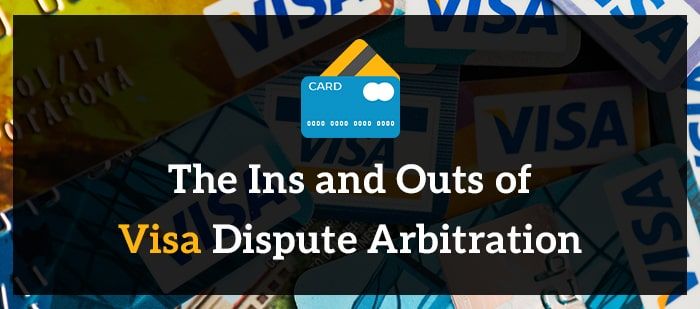
Have you ever experienced a transaction dispute with your Visa credit card? It can be frustrating and overwhelming trying to resolve the issue on your own. That’s where Visa Dispute Arbitration comes in. This process allows cardholders to dispute charges made on their Visa credit cards through a third-party mediator. In this blog post, we will dive into the details of Visa Dispute Arbitration, including what it is, how it works, and when to use it. So, if you’ve ever had a dispute with a Visa transaction, keep reading to learn all about Visa Dispute Arbitration and how it can help you resolve your issue.
Understanding Visa Dispute Arbitration
Visa Dispute Arbitration is a structured process designed to help Visa cardholders and merchants resolve transaction disputes fairly and efficiently. At its core, it serves as a form of conflict resolution that is invoked when initial attempts to settle a disagreement between a cardholder and a merchant do not reach a satisfactory conclusion. This process is governed by Visa’s regulations, ensuring that both parties have a fair chance to present their case.
The arbitration process begins when a cardholder identifies a transaction they believe is incorrect or fraudulent and reports it to their bank. If the dispute cannot be resolved through the bank’s investigation or through mediation with the merchant, the case may escalate to arbitration. During arbitration, both the cardholder and the merchant are asked to submit evidence supporting their claims. A neutral arbitrator, appointed by Visa, reviews the evidence and makes a binding decision based on the facts of the case.
It’s important to note that Visa Dispute Arbitration is a last resort, used only when all other dispute resolution avenues have been exhausted. The objective of this process is to ensure a just outcome based on the merits of the dispute, without the need for litigation, making it a critical tool for both consumers and merchants in resolving transaction conflicts.
Some Related Blogs
- Understanding the Importance of a High Return Customer Rate
- Arbitration Chargeback: What You Need to Know
- Dispute Apple Pay Transactions: What You Need to Know
- 5 Proven Strategies for Managing Chargebacks
The Visa Dispute Arbitration Process
The Visa Dispute Arbitration process begins when a cardholder contacts their issuing bank to report a questionable transaction. The bank initially attempts to resolve the dispute with the merchant directly. If these initial attempts fail, the cardholder can request arbitration. This request triggers the bank to file a formal arbitration case with Visa.
Once the case is filed, Visa appoints an independent arbitrator. Both the cardholder and the merchant are given the opportunity to provide evidence supporting their respective positions. This evidence can include transaction receipts, communications between the parties, and any other relevant documentation. It’s crucial that both sides submit their most compelling evidence, as the arbitrator’s decision is based on the documentation provided.
After reviewing all submitted evidence, the arbitrator issues a decision. This decision is binding, meaning it is final and must be accepted by both parties. The arbitrator may decide in favor of the cardholder, requiring the merchant to refund the disputed transaction, or in favor of the merchant, in which case the transaction remains valid.
Throughout this process, Visa ensures adherence to its established guidelines and standards, aiming to achieve a fair resolution based on the merits of each case. This structured approach helps maintain trust in the Visa payment ecosystem by providing a clear path to dispute resolution.
Preparing for Visa Dispute Arbitration
Preparing for Visa Dispute Arbitration involves thorough documentation and clarity on the dispute at hand. To begin, gather all relevant documents related to the transaction, including receipts, order confirmations, emails, and any correspondence with the merchant. This step is crucial as these documents will form the basis of your argument during the arbitration process. Next, compile a clear, chronological account of the dispute, ensuring to include dates, times, and any actions taken by both you and the merchant. This narrative should be factual, concise, and free of emotional language to maintain its objectivity and credibility.
![]()
Email us anytime!
Email customer service 24/7
![]()
Call us anytime!
Reach customer care 24/7 at +1 (888) 901-8653
Additionally, review Visa’s guidelines on dispute resolution to understand the criteria and evidence that may be required. It is also advisable to consult with your issuing bank to receive guidance and ensure that you have completed all necessary steps before proceeding to arbitration. Remember, the goal is to present a compelling, evidence-based case to the arbitrator, demonstrating that you have made reasonable attempts to resolve the dispute with the merchant directly. By preparing meticulously, you improve your chances of a favorable outcome in the Visa Dispute Arbitration process.
Common Reasons for Visa Dispute Arbitration
There are several scenarios that commonly lead to Visa Dispute Arbitration. One of the most frequent reasons is unauthorized transactions, which occur when a cardholder claims that a charge on their account was made without their consent. This can often be the result of fraudulent activity. Another common reason is disputes over the quality of goods or services received. In these cases, a cardholder might argue that what they received was significantly different from what was described or that the services or products were not delivered as promised.
Billing errors also lead to arbitration cases, including situations where a cardholder is charged the wrong amount or is billed for the same transaction more than once. Additionally, disputes may arise from the failure of a merchant to process a refund correctly or within the promised timeframe after a return or cancellation.
Lastly, disputes over non-receipt of goods or services are common, where cardholders claim that they did not receive the items or services they paid for. These situations, among others, underscore the variety of issues that can necessitate the intervention of Visa Dispute Arbitration to reach a resolution.



